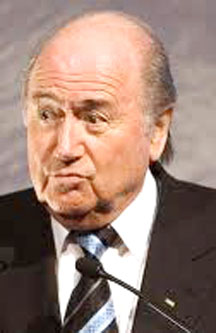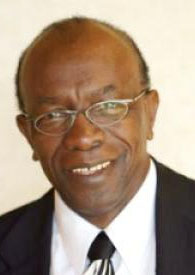MANCHESTER, (Reuters) – FIFA president Sepp Blatter wants the vote-selling scandal which has damaged attempts by world soccer’s governing body to clean up its image to be sorted out by the time he stands for re-election on June 1.

Former English FA chairman David Triesman has accused FIFA executive committee members Ricardo Teixeira, Jack Warner, Nicolas Leoz and Worawi Makudi of wanting incentives to vote for England’s ultimately unsuccessful 2018 World Cup bid.
“Let’s take some time to do it but we have to do it very fast, because we have a congress to come and we have to deal with this matter before the congress,” Blatter told Al Jazeera on Wednesday.
“We cannot just say to kick it out of the mind of FIFA and we will deal after… No, we have to do it now, immediately, we have exactly three weeks to do so, so we must accelerate the movement in the good or in the bad.”
FIFA wrote to the FA on Wednesday asking it to provide evidence to back up Triesman’s statements, made at the previous day’s British parliamentary inquiry into why the bid failed. Committee members sought to clear their names over allegations that have stunned Blatter three weeks before the man who has vowed to “clean FIFA” is due to stand against Qatari Mohamed Bin Hammam for soccer’s top job.
The vote will be taken at the FIFA Congress in Zurich, by which time Blatter hopes to have got to the bottom of the latest corruption issue to hit his organisation.
A total of eight of FIFA’s 24-strong key-decision making executive committee have now been accused by the British media and British parliamentary representatives of corruption, including two banned by FIFA last year over reports of vote-selling.
Blatter has distanced himself from executive committee members saying he does not choose them and that FIFA would react immediately against anyone in breach of the ethics code rules.
‘PURE INVENTION’
Those named at the inquiry have denied Triesman’s charges.
In an interview with Trinidadian newspaper Newsday, Warner said: “First of all, I laugh like hell because it took those guys from December to now (to know) that I have 2.5 million pounds ($4.12 million) I believe. I never asked anybody for anything.”

Triesman had accused Warner of asking for money to be “channelled through me” for an education centre in his home country Trinidad and Tobago. Warner said he had shown English FA officials a potential site but nothing had ever progressed.
Thai FA president Makudi joined Warner in denying asking for bribes, saying Triesman’s claim that he had wanted television rights for a proposed Thailand v England friendly was untrue.
“I have never discussed with Lord Triesman the issue of TV rights. If the match takes place, FIFA regulations will apply,” Makudi told Reuters by telephone. The FA scrapped plans for the match in the end. South America’s Conmebol president Leoz has declined to comment on Triesman’s claim that he had requested a knighthood in return for his vote, while Brazil’s CBF chief Teixeira is starting legal proceedings against Triesman.
The 2018 bid was not the only one embroiled in corruption charges as Members of Parliament involved in the inquiry also revealed the names of two other FIFA executive committee members accused of being paid to vote for Qatar’s successful 2022 bid.
FIFA vice-president Issa Hayatou of Cameroon and Jacques Anouma of Ivory Coast were accused of being paid $1.5 million to vote for Qatar, a charge “categorically denied” by Confederation of African Football (CAF) president Hayatou on Wednesday.
“The president of CAF said all these accusations brought against him are pure invention and an attempt to discredit him,” CAF said on its website (www.cafonline.com), referring to allegations which came from evidence submitted to the inquiry by the Sunday Times newspaper.




